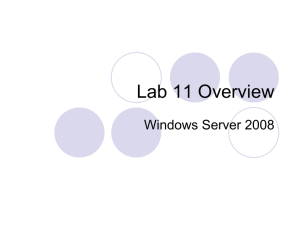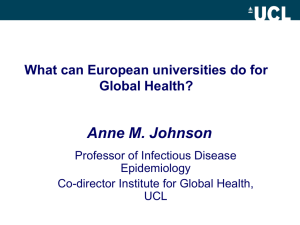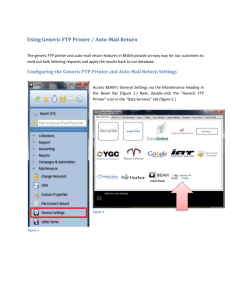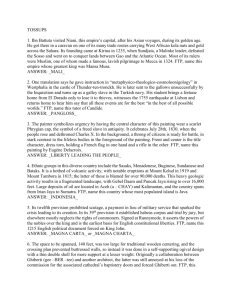Dr Peter Raven – SFtP and the role of student support
advertisement
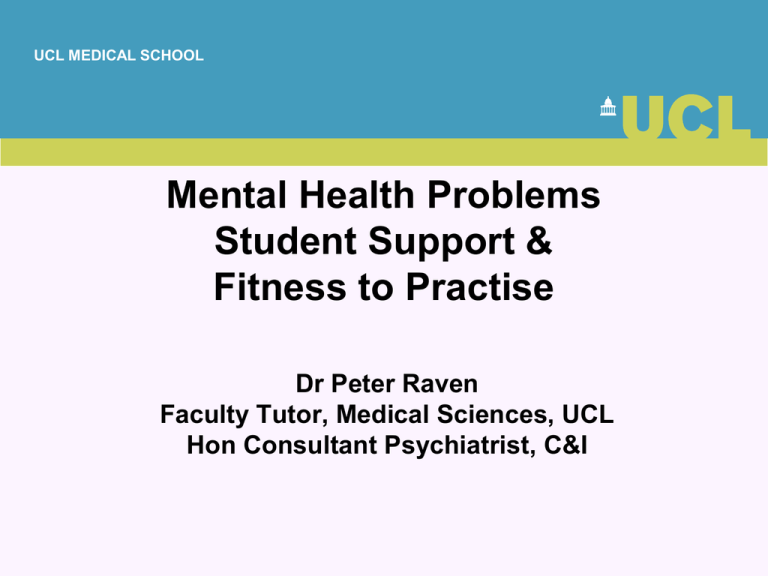
UCL MEDICAL SCHOOL Mental Health Problems Student Support & Fitness to Practise Dr Peter Raven Faculty Tutor, Medical Sciences, UCL Hon Consultant Psychiatrist, C&I An increasing problem? UCL Student Psychological Services • 137% increase in students registered over 5 years to 2012 • 2,482 students registered in 2012 • “More than any other UK university” Bad news: UCL students have more mental health problems Or Good news: breaking down barriers so that seeking help is OK The scale of the problem • UCL has over 14,000 full time undergraduate students • MBBS has >2,100 on a 6 year programme • About 1 in 6 of all UCL full time undergraduate students on a single programme • Common mental health problems are common – Recurrent depressive disorder, anxiety disorders including OCD, eating disorders, Personality Disorder (self-harm) At any one time in the Medical School • ~ 60 students on Close Supervision for mental health problems • ~ 120 other students with mental health problems known to us • ~ 120 more students with mental health issues not known • On average, 2-3 students leave the course each year due to mental health problems • On average, 1-2 students go to full FtP panel each year for mental health problems Pathways to support - disclosure Common • Student declares on admission – anxiety disorders eg OCD • Student discloses at the time – any • Academic issue, reveals underlying problem depression Pathways to support - disclosure Less common • Extenuating circumstances (unintentional disclosure) – depression/ anxiety • Peers raise concern – eating disorders • Hospital admission: MHA - psychosis/ bipolar; suicide attempt – borderline PD/ depression • Conviction/ caution – substance misuse Pathways to support - disclosure • Personal Tutor • Teachers – university academic • Teachers – NHS doctor (esp GP or psych) • Teachers – Clinical Skills Tutor • Teachers – Communication Skills Tutor • Administrators • Other eg chaplain All need to know how to refer on and who to Principles of support A responsible student needs to • Recognise the problem • Seek help • Accept treatment • Be aware if clinical interactions are impaired Principles of support A responsible support service needs to • Support the student not the medical school • Aim for the long term by establishing a positive relationship • Be aware that we are not the students’ doctors Support structures • • • • Support Tutors (or Personal Tutors) Occupational Health – liaise with GP or treating Dr UCL Student Psychological Services UCL Disability Office • Close Supervision • Student Support Card Support precedes FtP • Inform student that protected by disclosing • Advise student to go to Disability Office • Reassure student that done the right thing in seeking help – GMC expects us to look after our own health • Reassure student that MH problems no barrier to successful career • Refer student to Occupational Health Support precedes FtP • • • • Advise student to d/w GP if not already Advise student to see Student Psychological Service Reassure student re confidentiality (except FtP) Clarify responsibilities of support service and responsibilities of student • Not FtP at first discussion! Ongoing support - toolkit • • • • • • • See the same Support Tutor each time Negotiate reduced workload, eg deadlines Change placement Give student permission to take time out Use interruption as last resort Mentor support, learning support Student Support Card Student Support Card • Originally a way of communicating reasonable adjustments in a durable, portable format (credit-card sized) • Especially useful for clinical placements: range of teachers, frequent changes, confidentiality issues • Proved very useful for students with mental health problems and regular therapy appointments • Supporting students with disabilities using a ‘student support card’ scheme Raven, Griffin & Hinson (2008) Med Educ 42: 1142-3 . Sample card UCL Medical School Student Support Card This is to certify that Student Name has the following special circumstances: This student has a medical condition which requires regular appointments and I would be grateful for your understanding. Please contact me if you have any questions about this. This Card is valid: From: 1st September 2012 until 15th July 2014 Signed: Any queries regarding this should be directed to: Dr Peter Raven, Faculty Tutor. Benefits of Student Support Card • • • • • • Wording agreed with the student Student can choose whether and when to use it Flexible and allows for individual needs 90% of students felt they benefitted from possessing the card Students felt empowered But.... Hard to publicise to all teachers • Supporting students with disability and health issues: lowering the social barriers Cook, Griffin, Hayden, Hinson & Raven (2012) Med Educ 46:564-74 This card really gave me official credibility for leaving placements earlier as specified on my card. Without it, I would have to answer many questions and face some criticism. This card protected my interests, and allowed me to leave earlier without having to explain my full medical history to various staff, thus protecting my boundaries. There was a period of time before receiving my card that I had to explain everything to consultants and tutors, and the response was far more negative. The card was very, very useful 6th year student Problems with support Recognise problem Student lacks insight (not just psychosis) Seek help Student does not disclose on admission Student presents with conviction or hospital admission Student in denial about nature of problem Accept treatment Student disregards advice Be aware of impairment Inappropriate behaviour in clinical setting Problems with support - toolkit • • • • Occupational Health Read GMC advice on MH and FtP Learning agreement Interruption of study • Last resort - FtP Fitness to Practise • About one quarter of all UCL FtP referrals are due to mental health – Mental health issues + academic problems – Mental health issues + interruption of study – Recurrent or enduring mental health problems • 2 stage process • Initial FtP less formal – Can make requirements • Full FtP panel – Rarely used (8 cases in 5 years: eating disorder, OCD, PD, substance misuse) • More commonly, student unable to continue on course Support during FtP • FtP is stressful • Clear separation of support from “prosecution” of case • To provide pastoral support, within limits – Not to be the student’s “friend” at hearing – Not to provide references Support after FtP • May be requirement for monitoring – this is not pastoral support and should be separate • Support when returning from interruption with MH problems • Occupational Health review – fit to return? • Close supervision for year after return • Reasonable adjustments Difficult issues Boundaries Between support and FtP process Communication Between support and FtP process Students and staff need to know who to talk to Mixed messages from GMC Take more students with MH problems and look after them better I&I much more interested in students with MH problems




